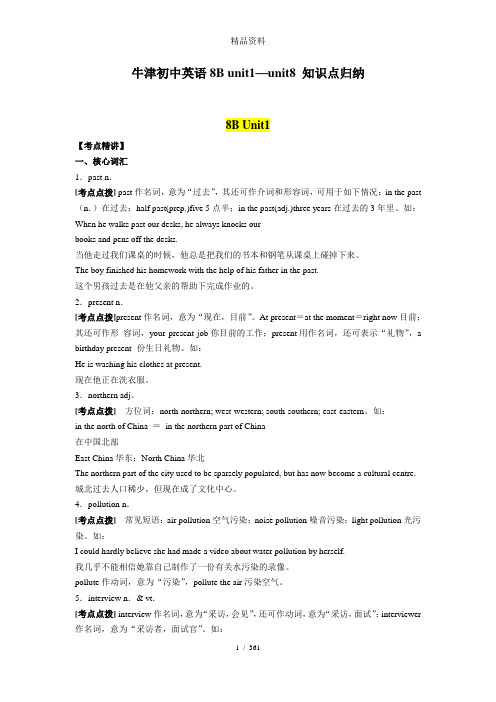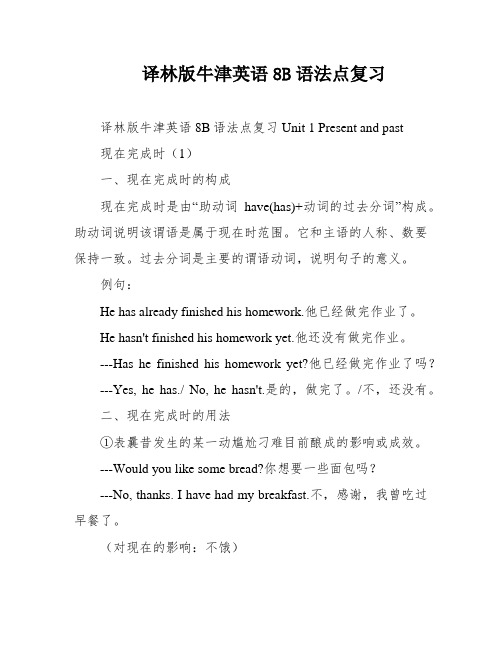牛津译林版8B语法知识点汇总36307
译林牛津八年级下册 8B知识点梳理.doc

牛津初中英语8B unit1—unit8 知识点归纳8B Unit1【考点精讲】一、核心词汇1.past n.[考点点拨] past作名词,意为“过去”,其还可作介词和形容词,可用于如下情况:in the past (n.)在过去;half past(prep.)five 5点半;in the past(adj.)three years在过去的3年里。
如:When he walks past our desks, he always knocks ourbooks and pens off the desks.当他走过我们课桌的时候,他总是把我们的书本和钢笔从课桌上碰掉下来。
The boy finished his homework with the help of his father in the past.这个男孩过去是在他父亲的帮助下完成作业的。
2.present n.[考点点拨]present作名词,意为“现在,目前”。
At present=at the moment=right now目前;其还可作形容词,your present job你目前的工作;present用作名词,还可表示“礼物”,a birthday present -份生日礼物。
如:He is washing his clothes at present.现在他正在洗衣服。
3.northern adj。
[考点点拨] 方位词:north-northern; west-western; south-southern; east-eastern。
如:in the north of China =in the northern part of China在中国北部East China华东;North China华北The northern part of the city used to be sparsely populated, but has now become a cultural centre. 城北过去人口稀少,但现在成了文化中心。
牛津译林版八年级下册8B-Unit3-重点知识总结

牛津译林版八年级下册8B-Unit3-重点知识总结本文档总结了牛津译林版八年级下册8B-Unit3的重点知识。
以下是该单元的内容摘要:1. 主题:本单元的主题是“记者报道”。
2. 词汇与短语:- 单词:reporter(记者),interview(采访),conference(会议),headline(标题),headline news(头条新闻)- 短语:be interested in(对...感兴趣),the same as(与...相同),get along with(和...相处),be proud of(为...自豪)3. 语法:- 一般现在时:用来描述经常发生的事情,如:She often writes reports.- 现在进行时:用来描述正在进行的动作,如:He is interviewing a famous actor.- 一般过去时:用来描述过去发生的事情,如:The reporter interviewed the mayor yesterday.4. 阅读理解:本单元共有两篇阅读理解,题目分别是“Interview with a Celebrity”和“A Day in the Life of a News Reporter”。
这两篇文章讲述了记者采访名人和新闻记者的工作日常。
5. 语言点:- 名词性从句:如:I know what you said.- 形容词性从句:如:The news is interesting because it is about a famous actor.- 定语从句:如:The boy who is talking to the reporter is my friend.以上是牛津译林版八年级下册8B-Unit3的重点知识总结,希望对你有帮助。
译林版牛津英语8B语法点复习

译林版牛津英语8B语法点复习译林版牛津英语8B语法点复习Unit 1 Present and past现在完成时(1)一、现在完成时的构成现在完成时是由“助动词have(has)+动词的过去分词”构成。
助动词说明该谓语是属于现在时范围。
它和主语的人称、数要保持一致。
过去分词是主要的谓语动词,说明句子的意义。
例句:He has already finished his homework.他已经做完作业了。
He hasn't finished his homework yet.他还没有做完作业。
---Has he finished his homework yet?他已经做完作业了吗?---Yes, he has./ No, he hasn't.是的,做完了。
/不,还没有。
二、现在完成时的用法①表曩昔发生的某一动尴尬刁难目前酿成的影响或成效。
---Would you like some bread?你想要一些面包吗?---No, thanks. I have had my breakfast.不,感谢,我曾吃过早餐了。
(对现在的影响:不饿)---Why don't you drive to your office?你为甚么不开车去办公室啊?---Because my car has broken.因为我的车坏了。
(对目前的影响:车没举措开了)①表示从过去开始一直持续到现在,也许还会继续下去的动作或状态。
He has studied English for 6 years.他已经研究英语六年了。
Mary has been busy since she came back from Hangzhou.自从从杭州回来,玛丽一直在忙。
3、常和目前完成时连用的工夫状语①用副词already和yet。
already一般用于一定句中,yet 一般用于否定句和疑问句中。
We have already finished our homework.我们已完成作业了。
译林版牛津英语8BUnit7知识点总结+单元练习

译林版⽜津英语8BUnit7知识点总结+单元练习Unit 7 International Charities内容全解Part One Comic strip重点全解1、You have some pocket money left.(P 92)1 pocket money “零花钱”。
例如:My parents often give me some pocket money.2 left 此处是leave 的过去分词,意思是“剩余的”。
例如:At the end of the party, we had some food left.拓展:(1)left 名词,意思是“左边”。
例如:The girl on the left is Lily.(2)left 副词,意思是“向左”。
例如:You can turn left at the second crossing.(3)left 形容词,意思是“左边的”。
例如:The post office is on the left side of the street.2、Let’s go and donate it. (P 92)1. let sb do sth. 让……做……例如:Let me help you.2.donate 动词,意思是“捐赠”donate sth. to sb 把某物捐赠给某⼈例如:I will donate my pocket money to the poor.3、It’s time for lunch.(P 92)1. It’s time for…=It’s time to do …是时候该做………例如:It’s time for school.= It’s time to go to school.4. Don’t worry. (P 92)worry 动词,“担忧,担⼼”,worry about sb/sth. 担⼼某⼈/某物例如:He worries about his mother’s health.5. I’m too weak to walk any further. (P 92)too+形容词+to “太……以⾄于不能……”例如:He is too young to carry that box.Part Two Welcome to the unitA重点全解1.ORBIS (国际奥⽐斯组织) (P 93)2.Oxfam (<英>⽜津饥荒救济委员会/乐施会)(P 93)3. UNICEF (United Nations International Children's Emergency Fund 联合国⼉童基⾦会)(P 93)4.WWF (World Wildlife Fund 世界野⽣动物基⾦)(P 93)B重点全解1、I know about a charity called UNICEF.(P93)1.know about表⽰“了解,知道”。
牛津译林版八年级英语全册语法知识点总结

1.句子结构:a.主语+谓语+宾语b.主语+谓语+间接宾语+直接宾语c.主语+谓语+宾语+宾语补足语d.主语+谓语+宾语+宾语补足语+定语e.主语+系动词+表语f.主语+不及物动词2.时态:a.一般现在时:表示现在经常性、习惯性的动作或状态。
b.现在进行时:表示现在正在进行的动作。
c.一般过去时:表示过去发生的动作或状态。
d.过去进行时:表示过去其中一时刻正在进行的动作。
e.一般将来时:表示将来的动作或状态。
f.将来进行时:表示将来其中一时刻正在进行的动作。
3.语态:a.主动语态:主语是动作的执行者。
b.被动语态:主语是动作的承受者。
4.动词时态和语态的被动形式:a. 一般现在时的被动形式:am/is/are+动词的过去分词。
b. 一般过去时的被动形式:was/were+动词的过去分词。
c. 将来时的被动形式:will be+动词的过去分词。
d. 现在进行时的被动形式:am/is/are+being+动词的过去分词。
e. 过去进行时的被动形式:was/were+being+动词的过去分词。
5.情态动词:a. can:表示能力、允许和请求。
b. may:表示许可、可能性和祝愿。
c. must:表示肯定、必要性和推测。
d. should:表示建议、责任和承诺。
e. might:表示推测、可能和祝愿。
f. would:表示假设、请求和习惯。
6.虚拟语气:a.虚拟语气用于表达虚构、假设、愿望、建议等。
b. 虚拟语气主要涉及以下几个时态:一般过去时、现在将来时、与现在相对的过去将来时、would/could+动词原形。
7.上文一致性:a.当主句用一般现在时态表述,宾语从句中的谓语动词将会保持不变。
b.当主句用过去时态表述,宾语从句中的谓语动词将用相应的过去时态。
总结完毕,以上是牛津译林版八年级英语全册所涉及的主要语法知识点。
译林牛津八年级下册8B知识点梳理

牛津初中英语8B unit1—unit8 知识点归纳8B Unit1【考点精讲】一、核心词汇1.past n.[考点点拨]past作名词,意为“过去”,其还可作介词和形容词,可用于如下情况:in the past(n.)在过去;half past(prep.)five 5点半;in the past(adj.)three years在过去的3年里。
如:When he walks past our desks, he always knocks ourbooks and pens off the desks.当他走过我们课桌的时候,他总是把我们的书本和钢笔从课桌上碰掉下来。
The boy finished his homework with the help of his father in the past.这个男孩过去是在他父亲的帮助下完成作业的。
2.present n.[考点点拨]present作名词,意为“现在,目前”。
At present=at the moment=right now 目前;其还可作形容词,your present job你目前的工作;present用作名词,还可表示“礼物”,a birthday present -份生日礼物。
如:He is washing his clothes at present.现在他正在洗衣服。
3.northern adj。
[考点点拨] 方位词:north-northern; west-western; south-southern; east-eastern。
如:in the north of China = in the northern part of China在中国北部East China华东;North China华北The northern part of the city used to be sparsely populated, but has now become a cultural centre.城北过去人口稀少,但现在成了文化中心。
牛津译林八年级下册8BUnit1 知识梳理
牛津译林八年级下册8BUnit1 知识梳理一、重点词汇:1. 时态标志词:一般现在时:from time to time=at times一般过去时:in the past现在进行时:at present现在完成时:in/during/over the past/last XX years / just /since /ever /over the years before (在句末,副词) yet recently重要考点:1) already, yet, just区别already, just只能用于肯定句,yet用于否定句和疑问句just只能放在have和done中间,already可以放在have和done中间或句末,yet只能放在句末。
2) since和for的区别,since的用法since+过去时间点;since+时间段 ago;since+从句(一般过去时) ;since doingIt is 时间段 since+从句for+时间段(注意时态未必是完成时,要看有没有持续到现在)3) just和just now的区别:just是现完标志词,just now是过去时4) ever表示的曾经不同于once,是现完标志词,一般用于疑问句,位置在done前面ever句型:It is the 最高级 sth that I have ever done5) before做副词才是现完标志词,做连词不是。
2. used to用法:(1) 句型:过去常常做used to do 过去有 there used to be 过去是 used to be(2) 同义:used to=once(3) 否定形式:usedn’t to didn’t use to(4) 辨析:be used to doing 习惯于做某事 be used to do 被用来做某事3. northern:在中国北部:in the north of China=in the northern part of China4. married:(1) 注意介词:get married to sb.(2) 持续性动词:be married to(3) 变形:marry vt. marry sb. marriage n. (了解)5. in some ways 在某种程度上way的短语:in this way 用这种方法 on the way to 在去某地的路上 in one’s way 挡了某人的道by the way 顺便说一下6. interview vt. 采访,面试 n. 采访,面试考点:区分动词,名词:have interviewed sb. have interviews with sb.7. return vi. 返回 vt. 归还return to return from 不与back共用return sth. to sb.8. abroad adv. 在国外go abroad 持续性动词be abroad 前面不加介词9. exactly adv. 正是,没错考查变形:exact-exactly考查中文提示:正是如此,确切地考查情景交际。
译林牛津八年级下册 8B知识点梳理
牛津初中英语8B unit1—unit8 知识点归纳8B Unit1【考点精讲】一、核心词汇1.past n.[考点点拨] past作名词,意为“过去”,其还可作介词和形容词,可用于如下情况:in the past (n.)在过去;half past(prep.)five 5点半;in the past(adj.)three years在过去的3年里。
如:When he walks past our desks, he always knocks ourbooks and pens off the desks.当他走过我们课桌的时候,他总是把我们的书本和钢笔从课桌上碰掉下来。
The boy finished his homework with the help of his father in the past.这个男孩过去是在他父亲的帮助下完成作业的。
2.present n.[考点点拨]present作名词,意为“现在,目前”。
At present=at the moment=right now目前;其还可作形容词,your present job你目前的工作;present用作名词,还可表示“礼物”,a birthday present -份生日礼物。
如:He is washing his clothes at present.现在他正在洗衣服。
3.northern adj。
[考点点拨] 方位词:north-northern; west-western; south-southern; east-eastern。
如:in the north of China =in the northern part of China在中国北部East China华东;North China华北The northern part of the city used to be sparsely populated, but has now become a cultural centre. 城北过去人口稀少,但现在成了文化中心。
牛津译林版8B语法知识点汇总
牛津译林版8B语法知识点汇总Unit 1词组:1和…玩play with sb2不再…not…any more3不同时期的交通工具transport at different times4阳光镇的变化the changes to Sunshine Town5非常了解这个地方know the place well 6从那时起since then7自从2005年以来since20058自从去年以来since last year9自从三个星期前以来since three weeks ago10搬家move house11搬到南京move to Nanjing12搬进一座新公寓move to/into a new flat13在…南部in the southern part of14结婚get married15和某人结婚be/get married to sb/marry sb16变化很大change a lot17在过去in the past18在现在at present19这些年以来over/during the years20把…变成…turn…into…21在周末at weekends22打牌play cards23下中国象棋play Chinese chess24愉快的假期pleasant holiday25玩得很开心have a pleasant time26水污染water pollution27噪音污染noise pollution28过去经常做某事used to do sth29像以前一样经常地…as often as before 30把…排进/倒进…dump…into…31一个很严重的问题a very serious problem32采取行动做某事take action to do sth33减少污染reduce the pollution34在某种程度上in some ways35顺便问一下by the way36在去…的路上on the way to…37挡路in the way38开阔的空间/户外活动场所open space 39不时地,偶尔from time to time40从…搬出去move out of…41事实上,实际上in fact42一处自然景点地方a place of natural beauty43一个新的火车站a new railway station 44从…借…borrow sth from sb45借给某人…/把…借给…lend sb sth=lend sth to sb46例如for example/such as47在使用中be in use=be in service48带…去…take sb to…49一所小学a primary school50我也是Me,too.51独自地on one’s own=by oneself=alone 52空余时间free time53有同感have the same feeling54青山环绕green hills around55清新的空气fresh air56良好的环境a good environment57发展缓慢less development58离…远be far(away)from59离…近be close to…60给…造成许多麻烦cause many problems for…61近期照片recent photos62在近几年中in recent years63…的反义词the opposite of…64有好运have good luck65把…扔掉throw sth away66一个真正的问题a real problem67写一篇有关阳光镇的文章write an article on Sunshine Town68在过去的一个世纪over the past century69关于北京的过去和现在about Beijing’s past and present70感冒have a cold71患重感冒have a bad cold72受到某人的来信hear from sb=receive a letter from 73乘飞机旅行travel by plane/by air 74享受阳光和沙滩enjoy the sun and the beach语法:现在完成时(I)我们用现在完成时表示从过去持续到现在的动作或状态,或已完成但对现在有一定影响的活动。
牛津译林版八年级下册8B Unit 7 知识点精讲
-2-
解析:is singing 是这句话的谓语动词,主语是 the bird,所以这句话的结构应该是主语+谓语。注意这里的 happily 是副词作状语,不是句子的主要成分。 7. him 解析:这里是双宾语结构。这里 him 接在 think 后面,需要用宾格。
-3-
A. S+V
B. S+V+DO+OC
C. S+V+IO+DO
D. S+V+P
4. The sentence structure of “Every morning we hear him read English aloud” is ______.
A. S+V+DO
B. S+V+DO+OC
C. S+V+IO+DO
8B Unit 7 知识点精讲
知识点1: 句子结构
Þ 对标课本:U7 语法
Þ 考点提炼
一、简单句的五种句型
1. 主 + 谓(S+V)
这类句型中的动词大部分是不及物动词(动词划分为及物动词和不及物动词),不及物动词后面不能直接跟
宾语。
2. 主 + 谓 + 宾(S+V+O)
3. 主 + 系(动词)+ 表(S+V+P)
表语常位于系动词之后。系动词可以分为两类。
(1)表示状态的连系动词。主要有:be, look, smell, taste, sound, feel, keep, seem, appear, remain
(2)表示转变或结果的系动词。主要有:become, get, grow. turn, go, come, prove
- 1、下载文档前请自行甄别文档内容的完整性,平台不提供额外的编辑、内容补充、找答案等附加服务。
- 2、"仅部分预览"的文档,不可在线预览部分如存在完整性等问题,可反馈申请退款(可完整预览的文档不适用该条件!)。
- 3、如文档侵犯您的权益,请联系客服反馈,我们会尽快为您处理(人工客服工作时间:9:00-18:30)。
牛津译林版8B语法知识点汇总Unit 1词组:1 和…玩play with sb2 不再…not…any more3 不同时期的交通工具transport at different times4 阳光镇的变化the changes to Sunshine Town5 非常了解这个地方know the place well6 从那时起since then7 自从2005年以来since 20058 自从去年以来since last year9 自从三个星期前以来since three weeks ago10 搬家move house11 搬到南京move to Nanjing12 搬进一座新公寓move to/ into a new flat13 在…南部in the southern part of14 结婚get married15 和某人结婚be/ get married to sb/ marry sb16 变化很大change a lot17 在过去in the past18 在现在at present19 这些年以来over/ during the years20 把…变成…turn…into…21 在周末at weekends22 打牌play cards23 下中国象棋play Chinese chess24 愉快的假期pleasant holiday25 玩得很开心have a pleasant time26 水污染water pollution27 噪音污染noise pollution28 过去经常做某事used to do sth29 像以前一样经常地…as often as before30 把…排进/ 倒进…dump…into…31 一个很严重的问题a very serious problem32 采取行动做某事take action to do sth33 减少污染reduce the pollution34 在某种程度上in some ways35 顺便问一下by the way36 在去…的路上on the way to…37 挡路in the way38 开阔的空间/ 户外活动场所open space39 不时地,偶尔from time to time40 从…搬出去move out of…41 事实上,实际上in fact42 一处自然景点地方a place of natural beauty43 一个新的火车站a new railway station 44从…借…borrow sth from sb45借给某人…/把…借给…lend sb sth= lend sth to sb46 例如for example/ such as47 在使用中be in use= be in service48 带…去…take sb to …49 一所小学a primary school50 我也是Me, too. 51 独自地on one’s own= by oneself= alone52 空余时间free time53 有同感have the same feeling54 青山环绕green hills around55 清新的空气fresh air56 良好的环境a good environment57 发展缓慢less development58 离…远be far (away) from59 离…近be close to…60 给…造成许多麻烦cause many problems for…61 近期照片recent photos62 在近几年中in recent years63 …的反义词the opposite of…64 有好运have good luck65 把…扔掉throw sth away66 一个真正的问题a real problem67 写一篇有关阳光镇的文章write an article on Sunshine Town68在过去的一个世纪over the past century69关于北京的过去和现在about Beijing’s past and present70感冒have a cold71 患重感冒have a bad cold72 受到某人的来信hear from sb= receive a letter from73 乘飞机旅行travel by plane/ by air74 享受阳光和沙滩enjoy the sun and the beach语法:现在完成时(I)我们用现在完成时表示从过去持续到现在的动作或状态,或已完成但对现在有一定影响的活动。
如:He has lived here since he came to Nanjing. 自从来到南京,他就住在这里。
I have lost my mobile phone. 我的手机丢了。
现在完成时常和already、ever、just、never、recently、yet等副词以及since、for引导的时间状语连用。
如:He has already taken first prize twice.他已经拿过两次一等奖了。
He has not returned the book to me yet. 他还没有把那本书还给我。
He has never visited the Great Wall. 他从没去过长城。
注意:already常用于肯定句,意思是“已经”,而yet常用于否定句和疑问句,意思是“还”。
现在完成时的动词构成:have/ has + 动词的过去分词大多数动词的过去分词变化形式同动词的过去式,可参照动词的过去式变化规则。
不规则动词的过去分词变化:有些动词的过去分词和过去式的变化形式相同,其变化情况大致分类如下:变化举例与原形相同hit- hit- hit hurt- hurt- hurt在原形后加t或d learn- learnt- learnt hear- heard- heard原形中的元音字母有变化get- got- got sit- sat- sat原形中的辅音字母有变化make- made- made spill- spilt- spiltfeel- felt- felt smell-smelt- smelt原形中的元音、辅音字母都有变化有些动词的过去分词和过去式的变化不同,其变化大致分类如下:变化举例与原形相同come- came- come run- ran- run原形中的元音字母有变化ring- rang- rung sing- sang- sung在原形上加en eat- ate- eaten fall- fell- fallen在原形上加n see- saw- seen give- gave- given在过去式上加n Steal- stole- stolen break- broke- brokendo- did- done go- went- gone原形、过去式和过去分词词性差异较大Unit 2 词组:1 到…作一次旅行go on a trip to…2 一定很有趣must be great fun3 带…出去几天take …out for a few days4 把…带在身边bring sth with sb5 快点;加油come on6 旅游景点tourist attractions7 …的象征a symbol of…8 去滑雪go skiing9 去远足go hiking10 看美丽的风景see the beautiful view11 拍照take photos12 欢迎到…welcome to…13 写信给…write to sb14 玩得很高兴have a fantastic time15 整天the whole day16 乘地铁by underground17 在入口处at the entrance18 高速运行move at high speed19 一家快餐店a fast food restaurant20 对…感兴趣be interested in21 不停地拍照ca't stop taking photos22 迪斯尼人物的游行a parade of Disney characters23 下午晚些时候later in the afternoon24 一天中最精彩的部分the best part of the day25 向…挥手致意wave to …26 一路上all the way27 像魔术一样be like magic28 精彩的狮王表演the great 'Lion King' show29 买一些纪念品buy some souvenirs30 在…结束时at the end of…31 观看烟火watch fireworks32 在烟火映衬下看起来很闪亮look shiny and beautiful under the firew orks33 一共,总计in all34 一次刺激的旅行an exciting trip35 把某物给某人看show sth to sb36 一队人a line of people37 排队等候wait in line38 一次有意义的经历a meaningful experience39 一次真得令人高兴的假日a really delightful holiday40 多姿多彩的服饰colourful costumes41 …一名成员a member of…42 到深圳旅游travel to Shengzhen43 全年all year around44 在即将到来的假日in the coming holiday45 依次/轮流做某事take turns to do sth46 计划出国旅游plan to travel abroad47 希望做某事hope to do sth48 希望某人做某事wish sb to do sth49 飞往某地fly to …50 新鲜的空气fresh air51 宜人的天气pleasant weather52 名胜古迹places of interest53 我们去香港旅游的日子the day of our trip to Hongkong54 三个半小时three and a half hours= three hours anda half55 鸟瞰香港的景色have a bird’s-eye view of Hongkong56 一座高楼耸立、夜晚灯光闪烁的现57 文化中心cultural centre 代化城市a modern city of tall buildings with lights shining in the evening语法:现在完成时(II)have/ has been和have/ has gone的用法●我们用have/ has been表示某人曾经去过某地,并且已经回来。
